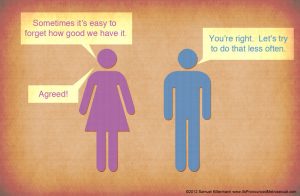
a person whose sense of personal identity and gender corresponds with their birth sex. This does not always correspond with sexuality (e.g. a person can be cisgender male-aligned and be gay). The privilege that comes with being cisgender is that a person will not be misgendered based on their appearance. Their physical appearance matches the typical physical appearance for a person of their sex. Drawing attention to gender in this way can also highlight that some people are disadvantaged because of their gender identity. That is, this term can create awareness that people who are not cisgender often have a harder time in our society than those who are. For example, trans men and women report higher levels of physical and verbal abuse than cisgender people.
However, this term is not fully representative of all gender identities. The term can be counter-intuitive and work against transgender becoming more accepted and normalised. It can falsely imply that only transgender people experience mismatch between their body/sex and gender identity. For example, lesbian, gay and bisexual people in particular may be cisgender but experience conflict between their gender identity and how society expects them to express gender. Others say the term does not account for people that identify as intersex. People that identify as intersex have atypical sex characteristics (for example genitals, hormones, reproductive glands and/or chromosomes). It is problematic to define their gender identity in relation to birth sex. From these perspectives, cisgender is limiting and divisive because it indicates there are only two possible gender identities linked to only two sexes.
For more information, read this article on The Explainer.
« Back to Glossary Index
